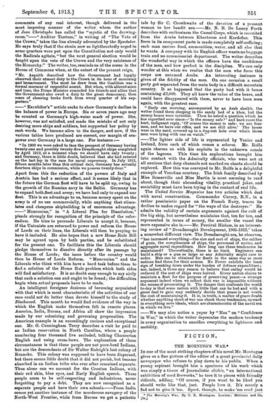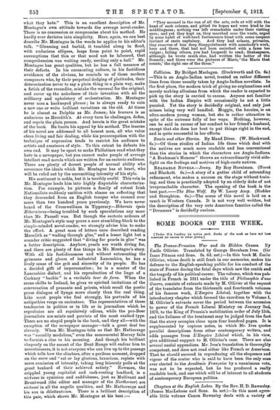FICTION.
1.11.h MORNING'S W...1R.*
Ix one of the most striking chapters of his novel Mr. Montague gives us a fine picture of the editor of a great provincial daily newspaper who refuses to play down to his public. When a young aspirant brought him a specimen of his work which was simply a tissue of journalistic clichés, "an international exhibition of used fireworks," he tore it to pieces with friendly ridicule, adding, " Of course, if you want to be liked you should write like that, just. People love it. It's merely a fad not to give it 'en,. Sport, though, to make 'em read just • The Morning's War, By C. E. Montague. Loudon : Methuen and Co. [93.]
what they hate." This is an excellent description of Mr.
Montague's own attitude towards the average novel-reader. There is no concession or compromise about his method. He
hardly ever deviates into simplicity. Here, again, we can best describe Mr. Montague in the words he applies to his editor's talk, " Gleaming and turbid, it tumbled along in flood, with audacious ellipses, leaps from point to point, rapid assumptions that this or that need not be laboured, that comprehension was waiting ready, needing only a bail." Mr. Montague has great qualities, but he has a full measure of their defects. In his coruscating culture, in his fastidious avoidance of the obvious, he reminds us of those modern composers who, by their perpetual dodging of platitudes, their determination never to say a plain thing in a plain way, make a fetish of the recondite, mistake the unusual for the original, and cover up the nakedness of their invention with all the millinery and upholstery of orchestration. Mr. Montague never uses a hackneyed phrase ; he is always ready to coin a new one or write brilliant variations on the old. At times he is almost as Delphic as Mr. James; his bravura is as audacious as Meredith's. At every turn he challenges, defies, and repels the plain person. And herein is the great mistake of the book. He limits bis appeal by his method. The lessons of his novel are addressed to all honest men, all who value clean living and fair dealing, while his preoccupation with the technique of expression tends to restrict his audience to artists and amateurs of style. _ To this extent he defeats bis own end. It may be sport to make Philistines read what they bate in a newspaper, but you cannot make people of average intellect read novels which are written for an esoteric audience. There are plenty of decent people of normal ability who reverence the ideals which Mr. Montagne has at heart, who will be ruled out by the unremitting intensity of his style.
His sentiment is noble, but it is terribly exalte. This vein in Mr. Montague leads him into highly disputable characteriza- tion. For example, he pictures a family of robust Irish Nationalists suddenly smitten with shame on reflecting that they descended from an English trooper who crossed over more than two hundred years previously. We have never heard of the Cromwellians in Tipperary—Hibernis ipsis Hiberniores—being troubled by such speculations any more than Mr. Parnell was. But though the esoteric ardours of Mr. Montague's style may prove a sore stumbling-block to the simple-minded novel-reader, we strongly advise him to make the effort. A great man of letters once described reading Meredith as "wading through glue," and a lesser light but a sounder critic suggested that " diving for pearls in glue" was a better description. Anyhow, pearls are worth diving for, and there are plenty of fine things in Mr. Montague's story. With all his fastidiousness and without extenuating the grimness and gloom of industrial Lancashire, he has a lively sense of the grit and sincerity of its people. He has a decided gift of impersonation ; he is a master of the Lancashire dialect, and his reproduction of the lingo of a Cockney " bookie " is a veritable tour de force. When the scene shifts to Ireland, he gives us spirited imitations of the conversation of peasants and priests, which recall the poetic prose dialogue of Synge more closely than the real thing. Like most people who feel strongly, his portraits of his antipathies verge on caricature. The representatives of those tendencies in politics or in life or in journalism which be reprobates are all repulsively odious, while the pro-Boer journalists are saints and patriots of the most exalted type. There are no stupid people in the book, and they all—with the exception of the newspaper manager—talk a great deal too cleverly. When Mi-.1!,Ionta,gue tells us that Mr. Hathersage was " seemlily modulous," even the monumental Murray fails to furnish a clue to his meaning. And though his brilliant rhapsody on the ascent of the Dent Rouge will endear him to mountaineers, it is not everyone who can live up to the passage which tells how the climbers, after a perilous moment, dropped on the snow and " sat or lay glorious, luxurious, replete with mere remission of intensity, taking long leisurely pulls at the great tankard of their achieved satiety." Newman, the crippled young capitalist and rack-renting landlord, is a virtuoso in cynicism and caddishness, just as Mullivant and Bruntwood (the editor and manager of the Northerner) are virtuosi in all the angelic qualities, and Mr. Hathersage and his son in dilettanteism. There is a brilliant description of this pair, which shows Mr. Montague at his best :—
"They mooned in the van of all the arts, rode at will with the head of each column, and pitied its hopes and were kind to its middlingness ; nothing was left remarkable under their visiting eyes; and yet they kept on, they marched over the waste, urged by some habit of well-bred forbearance blent with some unspent instinct of caste captaincy. And they had solaces, privacies, tiny reserves of less deep disappointment with somebody's work, here and there, that had not been smirched with a fame too vulgar; failing others, you had Leopardi to read; Shakespeare, although he wrote much else, had written the better of the Sonnets ; and there were the pictures of Maris,' the Maris that counts,' the right one of the three."







































 Previous page
Previous page